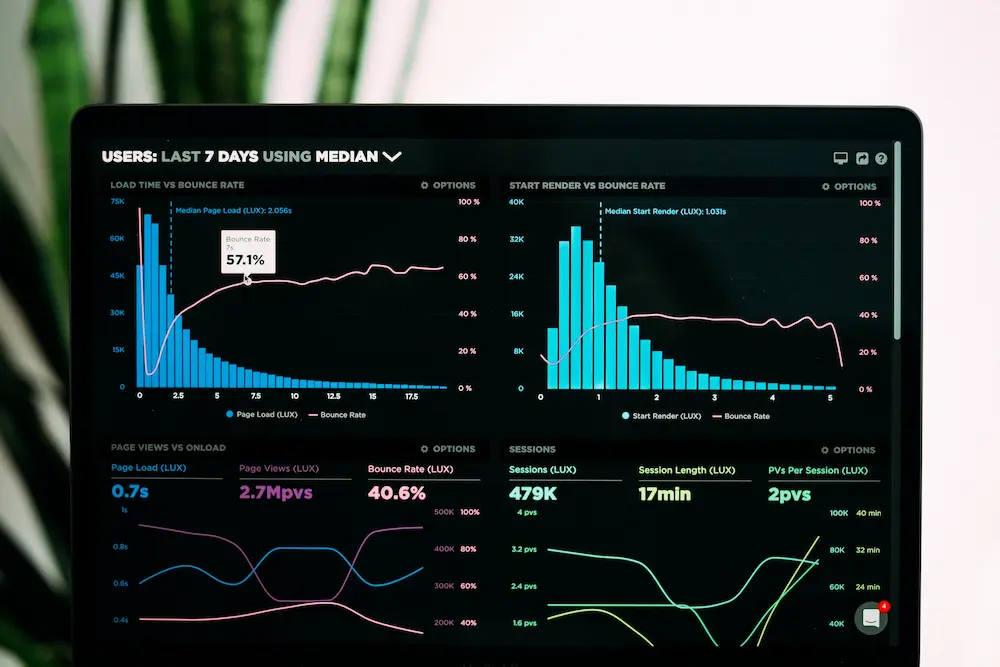Marketers have plenty of data at their fingertips. And that's the problem.
We have more data than ever, but struggle mightily to capture its full value.
Artificial intelligence can help.
AI tools today exist that surface insights marketers just don't see — and make predictions based on analysis at scale that marketers just can't do. AI can even unify your data sources, helping you get more value out of what you already have.
In fact, there are a few big ways marketers can start using AI in analytics today.
Read on to discover what they are.
Discover Insights
Your analytics data is almost certainly hiding key insights that can improve sales. AI is your best friend when it comes to discovering these insights. That's because humans often don't have the skill or speed to find these insights in datasets at scale.
- Get answers to questions about your Google Analytics data. Google Analytics' Analytics Intelligence applies the tech giant's sophisticated machine learning to your Google Analytics data. Type in a natural language query — think "Which channel had the highest conversion rate?" — and Google's AI will deliver a response in seconds after analyzing your data.
- Get answers to questions about your business data. Keyence does the same thing, but for all your business data. Using Keyence, you simply input your data and ask questions around business problems you'd like to solve. The system then generates plans and strategies to make the most impact.
- Discover insights across online and offline data sources. Adobe Analytics uses AI to parse your analytics data from a variety of sources, both online and offline. This gives you a cohesive picture of what's going on in your marketing, no matter how many channels you use. Adobe's machine learning then analyzes — and visualizes — insights from these data sources.
Predict Outcomes
Artificial intelligence isn't just designed to analyze large datasets. It excels at making predictions based on them. In fact, almost every powerful thing AI does is based on prediction in some way.
- Understand what your competitors are going to do next. Crayon monitors 100+ data types from across the internet to track what competitors are doing online. That includes everything from product and pricing changes to actual marketing campaigns they're launching. Crayon's AI then surfaces insights about this data, to help you gain a competitive edge and predict what competitors will do next.
- Predict what your audience wants. Helixa helps you produce detailed personas based on audience interests, demographics, and psychographics. That includes data on consumers at large, social media audiences, and influencers within your industry. Helixa is able to do this thanks to sophisticated AI trained on current human behavioral research — and exposed to demographic and census data.
Unify Your Data
Analyzing all your data in a single, unified place is also a job AI does well. In fact, AI systems can unify your customer data across first-party sources. It can also unify your data from systems that were historically hard to access, like call tracking data and analytics.
- Unify customer data from first-party sources. BlueConic "liberates" your first-party data from all the disparate sources it exists, then unifies it so you can use it across your marketing efforts. This results in a single customer view, no matter how many analytics sources you're using. Once your data is unified, BlueConic uses machine learning models to help you get more value out of that data, including creating customer scores and building sophisticated segmentation.
- Unify call tracking data and analytics. Invoca offers an AI-powered call tracking and analytics platform that helps you connect call center sales to marketing activities in one unified view. That includes closing the loop on attribution, building audiences, and dynamically routing calls.
How to Get Started with AI in Analytics
If you're a marketer who works with analytics, chances are that AI can help you increase revenue and reduce costs. That means now is the time to get started with AI, no matter your skill or comfort level.
To do so means you build a potentially insurmountable competitive advantage. To delay means you risk getting left behind.
Good news, though:
There are two ways to accelerate AI adoption in your career and your company.
The first is by accessing our free Ultimate Beginner's Guide to AI in Marketing.
The Ultimate Beginner’s Guide to AI in Marketing is a free resource with 100+ articles, videos, courses, books, vendors, use cases, and events to dramatically accelerate your AI education. It's based on the years we spent on research and experimentation—and you can access this knowledge in a fraction of the time.
The second is by attending our Marketing AI Conference (MAICON).
MAICON brings together top authors, entrepreneurs, AI researchers, and executives to share case studies, strategies, and technologies that make AI approachable and actionable for marketers.
Last year's event brought together 300+ marketers, including attendees from 12 countries and 28 states. The conference is simply the best way to learn how to adopt AI, straight from marketing leaders already using the technology.
Mike Kaput
Mike Kaput is the Chief Content Officer at SmarterX and a leading voice on the application of AI in business. He is the co-author of Marketing Artificial Intelligence and co-host of The Artificial Intelligence Show podcast.


